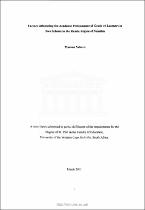| dc.description.abstract | In this mini-thesis, the researcher investigates factors influencing the academic performance of grade 10 learners in two schools in the Rundu Region of Namibia. The position which the researcher develops maintains that there are factors influencing the academic performance of grade l0 learners in the two schools under study. These factors are not known yet and have to be identified. The researcher critically looks at the findings of the study by Christie et al (1997), entitled School Development in South Africa: a research project to investigate intervention for quality improvement in South African schools and adopted their approach of interviewing principals, parents, teachers and learners to identify factors they perceive to have an influence on the Academic performance of grade l0 learners in the two schools. This approach is supplemented by school and classroom observations in order to determine practices and procedures followed by the two schools. The data obtained from interviews and observations reveal that factors such as Teacher qualifications, teacher experience, commitment to tasks, discipline, English language problem, attitude towards world culture of silence in class, availability of resources, school leadership, parental involvement and ministerial policies influence the academic performance of grade l0 learners in the two schools. The researcher then argues that most of these factors if not all of them are well within the domain of the school leadership to deal with. The capabilities and skills of the school leadership, thus determine whether the academic performance of the learners is negatively or positively influenced. The researcher therefore concurs with Haasbroek (1998) when he maintains that the differences in the performances of schools might be found in the broader context of how schools are being managed and governed and in the hidden curriculum of the schools. The mini-thesis is concluded with recommendations on how to minimize the negative impact of the identified factorions academic performance of grade l0 learners in the
Rundu Region of Namibia. | en_US |

